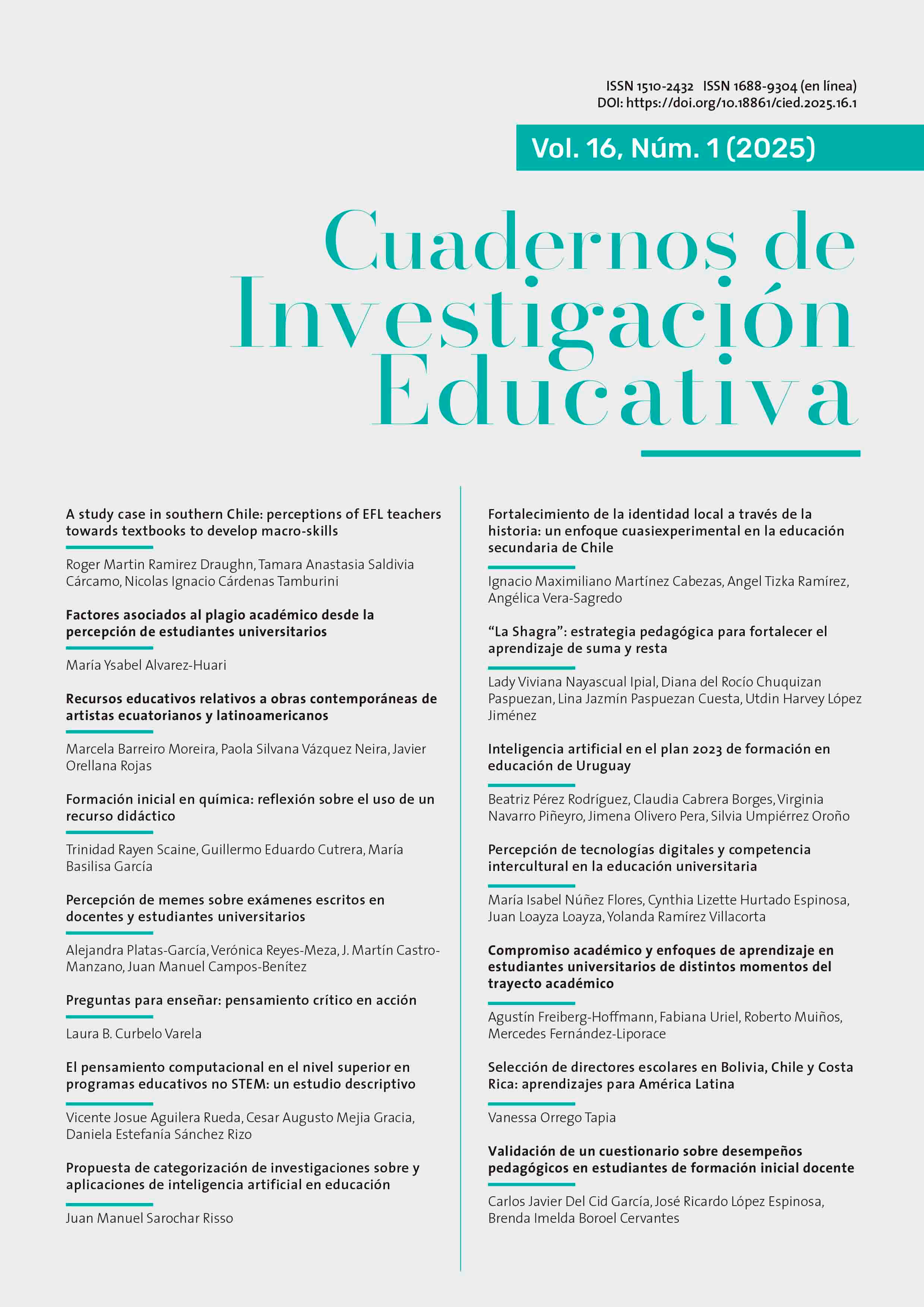“The Shagra”: a pedagogical strategy to enhance addition and subtraction learning
DOI:
https://doi.org/10.18861/cied.2025.16.1.3943Keywords:
active learning, pedagogical strategy, The Shagra, basic mathematics, contextualized teachingAbstract
This study addresses the implementation of "La Shagra" as an innovative pedagogical strategy to enhance learning of addition and subtraction among first-grade primary school students. The main objective was to improve understanding and mastery of these basic mathematical concepts using a practical and contextualized approach. Conducted at the Marpi Educational Center, located in the Indigenous Reservation of Chiles, Municipality of Cumbal, Department of Nariño, Republic of Colombia, this research employed a mixed-methods approach with a group of 12 students across several sessions. Following the stages of action research, tools such as surveys and the standardized test called Basic Mathematics Competence Test were employed. These instruments served both in the diagnostic phase to identify the students' initial difficulties and in the evaluation phase to measure their progress. The results indicated a significant improvement in students' comprehension of addition and subtraction concepts and increased confidence when performing mathematical operations. Additionally, there was greater participation and collaboration during the learning process, suggesting that the strategy effectively fostered a dynamic and participative learning environment. In conclusion, implementing "La Shagra" proved to be a valuable tool for strengthening basic operations learning in primary-level students, highlighting the importance of practical and contextualized approaches in mathematics education and the creation of motivating educational environments.
Downloads
References
Acosta, F., Fárez, V., & Cevallos, B. (2019). La experiencia de la Chakra, como ambiente de aprendizaje, en el Centro de Educación Infantil de Innovación UNAE. IN-RED, 5(1), 1-10. http://dx.doi.org/10.4995/INRED2019.2019.10388
Carpintero, M. (2022). Matehuerto: El huerto escolar ecosostenible como recurso educativo en matemáticas. Edma 0-6: Educación Matemática En La Infancia, 11(2), 38-64. https://doi.org/10.24197/edmain.2.2022.38-64
CEPROSI. (2018). Aprendiendo desde la Chacra. Pakarina Ediciones.
Chichande, G. (2021). La motivación y su influencia en el nivel del aprendizaje en el área de matemática de la Escuela de Educación Básica “La Maná”. Universidad Técnica de Cotopaxi.
De Castro, C., & Balop, B. (2019). ¿Ayudan los materiales manipulativos a resolver tareas matemáticas? Investigación en Educación Matemática, 23, 243-252.
Gómez, M. (2020). Propuesta para fortalecer la chagra andina desde el conocimiento ancestral. Universidad Distrital Francisco José de Caldas.
Gonzáles, N. (2019). Detección temprana de las dificultades específicas de aprendizaje en el área de las matemáticas. Universidad de La Laguna. https://riull.ull.es/xmlui/handle/915/15393
Gutiérrez, Á., & Jaime, A. (2021). Desafíos actuales para la Didáctica de las Matemáticas. Revista Innovaciones Educativas, 23(34), 198-203. https://doi.org/10.22458/ie.v23i34.3515
Guzmán, A., Ruiz, J., & Sánchez, G. (2021). Estrategias pedagógicas para el aprendizaje de las operaciones matemáticas básicas sin calculadora. Ciencia y Educación, 5(1), 55-74. https://doi.org/10.22206/cyed.2021.v5i1.pp55-74
Hernández, R., & Mendoza, C. (2018). Metodología de la Investigación: Las Rutas Cuantitativa, Cualitativa y Mixta. McGraw Hill.
Hidalgo, D. (2021). Aprender a enseñar matemáticas en educación primaria. Universitat de Barcelona. https://doi.org/10.1344/did.2021.10.199-202
Llanes, J., Méndez, J., & Montané, A. (2021). Motivación y satisfacción académica de los estudiantes de Educación: una visión internacional. Educación XXI, 24(1), 45-68. https://doi.org/10.5944/educxx1.26491
Martínez, O., Trujillo, C., Lomas, K., Moreno, J., & Dávalos, V. (2019). Saberes matemáticos ancestrales de una chakra andina. Revista Espacios, 40(36), 15-27.
Miranda, Z., & García, L. (2022). La Chagra: Una Experiencia de Endoculturación hacia la Soberanía Alimentaria. Inclusión Y Desarrollo, 9(1), 87-96. https://doi.org/10.26620/uniminuto.inclusion.9.1.2022.87-96
Muñiz, L., Menéndez, C., & Rodríguez, L. (2020). Una experiencia de educación matemática mediante aprendizaje cooperativo e integración de competencias en Educación Primaria. TANGRAM - Revista De Educação Matemática, 3(3), 178-202.
Núñez, R., & Tuesta, G. (2021). Desarrollo del lenguaje y pensamiento numérico en educación inicial: una revisión bibliográfica. Conrado, 17(78), 230-233.
Obando, O. (2022). La chagra estrategia pedagógica que rescata y fortalece la cultura propia de los alumnos del grado quinto de primaria de la Institución Educativa San Lorenzo de Yaramal, Municipio de Ipiales, Nariño. Universidad Nacional Abierta y a Distancia - UNAD. https://repository.unad.edu.co/bitstream/handle/10596/53259/ocobandor.pdf?sequence=1&isAllowed=y
Rivas, R., & Párraga, J. (2022). Estrategia didáctica con el uso de Recursos Educativos Digitales para la enseñanza-aprendizaje de las operaciones matemáticas básicas en el subnivel elemental. MQRInvestigar, 6(4), 863-875. https://doi.org/10.56048/MQR20225.6.4.2022.863-875






